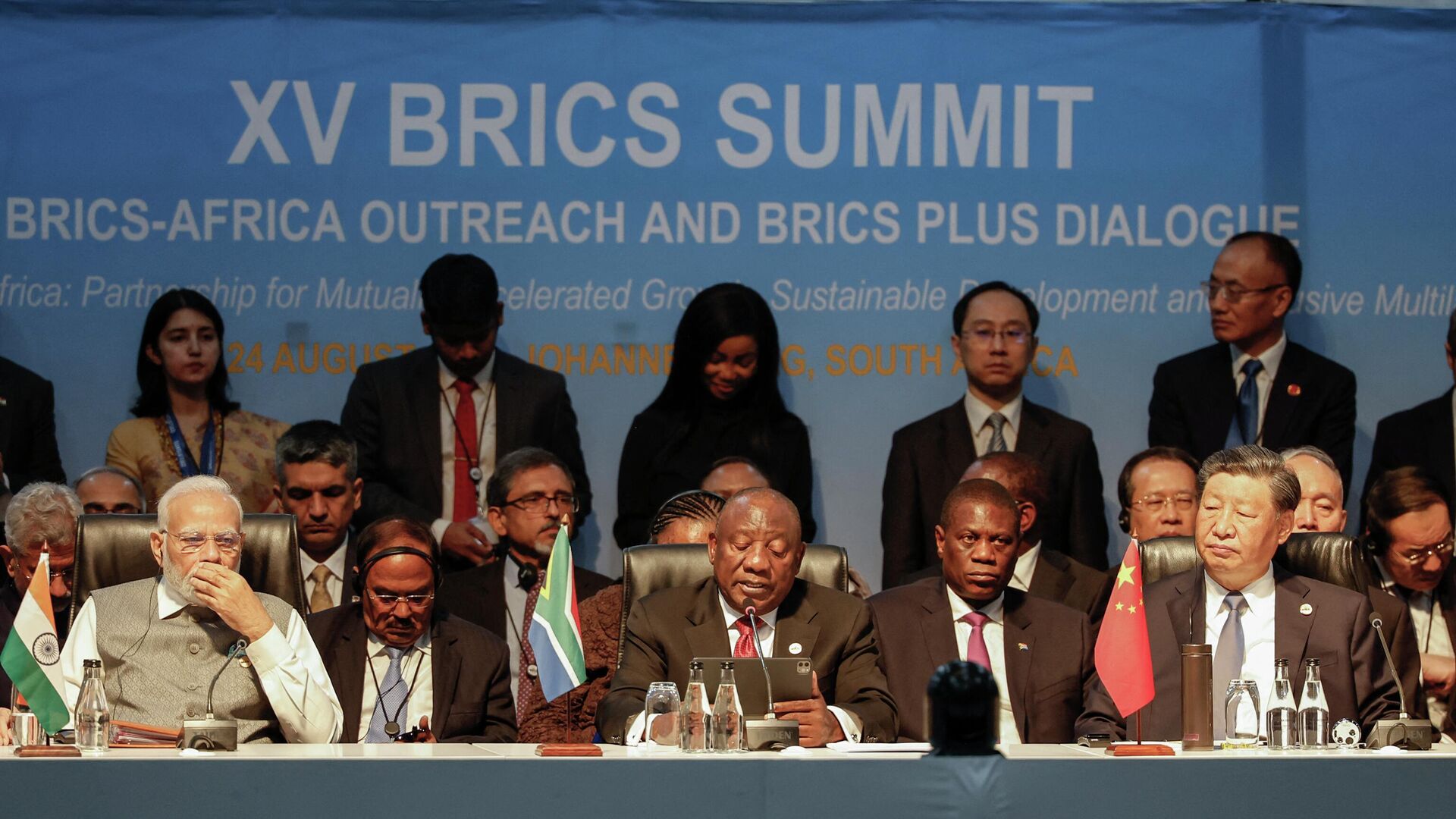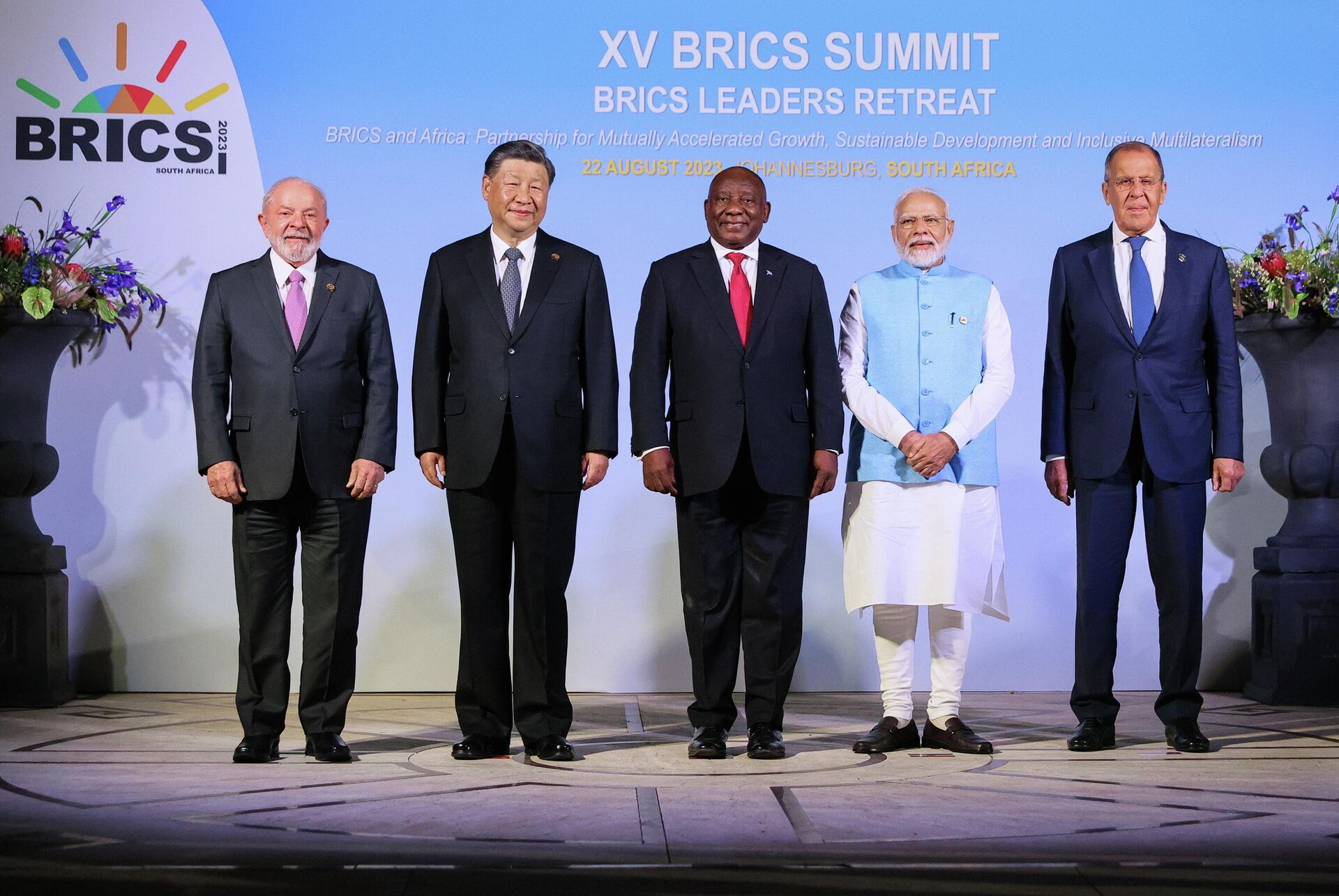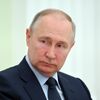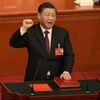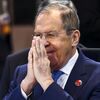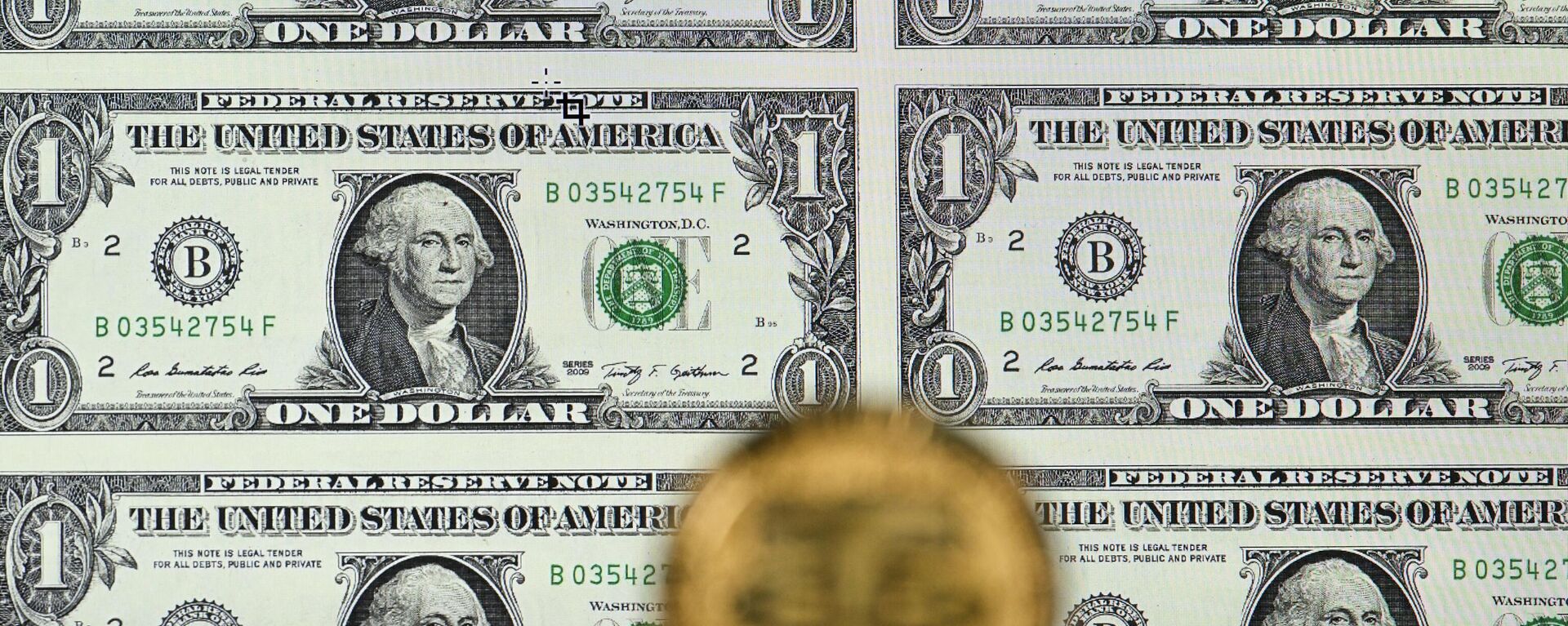https://sputniknews.in/20230829/brics--the-summit-that-changed-the-world-3916931.html
BRICS – The Summit That Changed the World
BRICS – The Summit That Changed the World
Sputnik India
In his column for Sputnik India, S.L. Kanthan explains why the 15th BRICS summit may go down in history as the epochal event that changed the 21st century and heralded a multipolar world.
2023-08-29T17:42+0530
2023-08-29T17:42+0530
2023-08-29T17:46+0530
sputnik opinion
global south
brics
brics currency
brics expansion
2023 brics summit
vladimir putin
sergey lavrov
russia
india
https://cdn1.img.sputniknews.in/img/07e7/08/1d/3916473_0:160:3072:1888_1920x0_80_0_0_cdf1b4d7bed8a3e279454201e01a6d2f.jpg
In 1955, Asian and African countries representing half the world’s population got together in Bandung, Indonesia, to architect a post-colonial framework for development and peace. It was an inspiring moment, but the noble ambitions soon dissipated, thanks to the Western imperialists’ coups, assassinations, and wars. However, almost 70 years later, the spirit of Bandung was resurrected in Johannesburg, South Africa, at the BRICS Summit last week.This time, the Global South is much more powerful, united, and determined. The transformative BRICS summit might go down in history as the epochal event that changed the 21st century and heralded a multipolar world, ushering in a period of more justice and fairness, prosperity and peace.BRICS Summit HighlightsUsually, the annual summits of BRICS – a loose collection of Brazil, Russia, India, China and South Africa – are not newsworthy. However, this year, something stunning happened: more than 40 countries applied to join the group! And representatives of more than 60 countries attended. Even French president Macron wanted to attend, although his request was turned down. (Ha-ha).BRICS expansion – who to admit and how many – was not easy, since there were many practical and geopolitical considerations. China wanted to bring in 10 new members, while India wanted 3. Eventually, Russia helped reach a compromise. Six new members were admitted – Saudi Arabia, Iran, UAE, Argentina, Egypt, and Ethiopia.All six were strategic choices.Saudi Arabia and Iran represent not only two natural resource giants but also the victory of peaceful vision over the divide-and-rule playbook of imperialism. The West had fueled the Sunni-Shiite and Arab-Persian division for decades. Then, thanks to China, both countries were able to achieve rapprochement and embark on a new path of cooperation and diplomacy. The addition of Iran is also a slap on the face for Western sanctions, which are imperialist and immoral.Furthermore, thanks to the UAE – another crucial player in the Middle East – the new “BRICS+” accounts for staggering 45% of world’s oil production and 50% of world’s natural gas reserves.Argentina, the new BRICS member, is the second largest economy in Latin America and is rich in natural resources (lithium) and agricultural products (corn). Furthermore, Brazil has said that it will accept Chinese Renminbi for its exports to Argentina; and India just carried out its first trade with the UAE in rupee and dirham.Two other new members – Egypt and Ethiopia – also have a lot of geopolitical significance. Egypt has the largest military in Africa; Ethiopia is the second most populous nation in Africa, has grown its economy 15-fold over the last two decades, and has a strategic location in the horn of Africa.Other than the expansion of the group and trading in local currencies, there is one more critical topic: the New Development Bank (NDB) a.k.a. “BRICS Bank.” It has its own membership plan and will admit more countries –there are already non-BRICS members such as Bangladesh. The game-changing idea is to start lending in local currencies instead of US dollar, thus emancipating developing countries from the dollar trap.The NDB, which was set up in 2015, is based out of Shanghai. Interestingly, its chief is Dilma Rousseff, former Brazilian President.Here is a little bit of history to understand why it matters.China’s Xi Jinping also emphasized NDB’s role: “We need to fully leverage the role of the New Development Bank, push forward reform of the international financial and monetary systems, and increase the representation and voice of developing countries.”Famous Quotes from the SummitHere are some quotes from the BRICS Summit that shed light on the historic changes that are sweeping across the world:Lula de Silva had also said earlier, “Every night I ask myself why all countries must base their trade on the dollar. Why can’t we do trade based on our own currencies?”In his other remarks, Xi said, “Changes in the world are unfolding in ways like never before, bringing human society to a critical juncture. International rules must be written [down] and jointly upheld by all countries.” (The last sentence was a dig at the US’ hypocritical rules-based order).Why BRICS+ MattersThere are five key reasons why BRICS+ matters:In summary, two things must happen: eliminate dollar’s rigged privileges and end the weaponization of dollar. These new paradigms are essential for the growth and security of not only emerging countries but also advanced economies such as Europe, Japan and South Korea, which are still colonized by the US.Goodbye, American CenturyThe US dollar’s hegemony is facing death by a thousand cuts. What American media and economists do not understand is that dedollarization is not a single event, but a gradual process.New World Order of MultilateralismThe core problem that developing nations have faced since WW2 is the inability to unite to challenge Western hegemony. But finally, BRICS is poised to begin the decolonization process. The Global South – the silent majority – now has enough wisdom and economic power to make multipolar world a reality.Well, the new BRICS-11 accounts for world’s 45% of oil production, 50% of natural gas reserves, 65% of coal, and 50% of vital grains such as wheat, rice, corn, and soybeans. Moreover, China alone controls 85% of the global capacity for processing rare earth minerals – without which no smartphone, computer, missile, or fighter jet can work – and 90% of the battery supply chain.Thus, the only non-violent tool left for the imperialists is sanctions, but that is coming to an end soon as well – as seen by the epic failure of US/EU sanctions against Russia.Perhaps BRICS will one day come up with its own trading currency, which may even be backed by gold or commodities. Until then, Chinese yuan will act as the “BRICS currency.” However, member countries can also trade and borrow in local currencies to varying degrees – depending on the trade balances. There are also options to barter – for example, Iran and China just made a deal where the Chinese will build an airport in Iran and receive Iranian oil as payments.In conclusion, the rise of a multipolar is inexorable. The most encouraging aspect of this movement is that the leaders and the people at grassroots level have the right philosophy. The difference between BRICS community and the West is stark when one listens to the choice of words at the summit – “cooperation,” “development,” “collaboration,” “dialogue,” “partnership,” “trust,” “peace,” “respect,” “ethos” and so on.It is time to decolonize the world and embrace multilateralism. The new version of BRICS offers just that possibility.
https://sputniknews.in/20230822/ditching-the-petrodollar-will-benefit-global-south-expert-reckons-3764196.html
global south
russia
india
china
iran
saudi arabia
us
Sputnik India
feedback.hindi@sputniknews.com
+74956456601
MIA „Rossiya Segodnya“
2023
News
en_IN
Sputnik India
feedback.hindi@sputniknews.com
+74956456601
MIA „Rossiya Segodnya“
Sputnik India
feedback.hindi@sputniknews.com
+74956456601
MIA „Rossiya Segodnya“
brics summit, brics summit south africa, 2023 brics summit, brics enlargement, new brics members, brics members, brics summit in johannesburg, brics expansion, brics currency, brics meaning,
brics summit, brics summit south africa, 2023 brics summit, brics enlargement, new brics members, brics members, brics summit in johannesburg, brics expansion, brics currency, brics meaning,
BRICS – The Summit That Changed the World
17:42 29.08.2023 (Updated: 17:46 29.08.2023) In his column for Sputnik India, S.L. Kanthan explains why the 15th BRICS summit may go down in history as the epochal event that changed the 21st century and heralded a multipolar world.
In 1955, Asian and African countries representing half the world’s population got together in Bandung, Indonesia, to architect a post-colonial framework for development and peace.
It was an inspiring moment, but the noble ambitions soon dissipated, thanks to the Western imperialists’ coups, assassinations, and wars.
However, almost 70 years later, the spirit of Bandung was resurrected in Johannesburg, South Africa, at the BRICS Summit last week.
This time, the Global South is much more powerful, united, and determined. The transformative BRICS summit might go down in history as the epochal event that changed the 21st century and heralded a multipolar world, ushering in a period of more justice and fairness, prosperity and peace.
Usually, the annual summits of BRICS – a loose collection of Brazil, Russia, India, China and South Africa – are not newsworthy. However, this year, something stunning happened: more than 40 countries applied to join the group! And representatives of more than 60 countries attended. Even French president Macron wanted to attend, although his request was turned down. (Ha-ha).
BRICS expansion – who to admit and how many – was not easy, since there were many practical and geopolitical considerations. China wanted to bring in 10 new members, while India wanted 3. Eventually, Russia helped reach a compromise. Six new members were admitted – Saudi Arabia, Iran, UAE, Argentina, Egypt, and Ethiopia.
All six were strategic choices.
Saudi Arabia and Iran represent not only two natural resource giants but also the victory of peaceful vision over the divide-and-rule playbook of imperialism. The West had fueled the Sunni-Shiite and Arab-Persian division for decades. Then, thanks to China, both countries were able to achieve rapprochement and embark on a new path of cooperation and diplomacy. The addition of Iran is also a slap on the face for Western sanctions, which are imperialist and immoral.
Furthermore, thanks to the UAE – another crucial player in the Middle East – the new “BRICS+” accounts for staggering 45% of world’s oil production and
50% of world’s natural gas reserves.
Imagine if these oil-rich countries started to trade oil in currencies other than the US dollar. That would be the end of Petrodollar, which underpins American hegemony. Even a partial trade in other currencies – especially Chinese yuan – will have a profound impact. Given that Saudi Arabia’s trade with China is 3x bigger than with the US, wide acceptance of “petroyuan” is just a matter of time.
Argentina, the new BRICS member, is the second largest economy in Latin America and is rich in natural resources (lithium) and agricultural products (corn). Furthermore, Brazil has said that it will accept Chinese Renminbi for its exports to Argentina; and India just carried out its first trade with the UAE
in rupee and dirham.
Two other new members – Egypt and Ethiopia – also have a lot of geopolitical significance. Egypt has the largest military in Africa; Ethiopia is the second most populous nation in Africa, has grown its economy 15-fold over the last two decades, and has a strategic location in the horn of Africa.
Other than the expansion of the group and trading in local currencies, there is one more critical topic: the New Development Bank (NDB) a.k.a. “
BRICS Bank.” It has its own membership plan and will admit more countries –there are already non-BRICS members such as Bangladesh. The game-changing idea is to start lending in local currencies instead of US dollar, thus emancipating developing countries from the dollar trap.
The NDB, which was set up in 2015, is based out of Shanghai. Interestingly, its chief is Dilma Rousseff, former Brazilian President.
Here is a little bit of history to understand why it matters.
During the Cold War, the USA installed brutal military dictators all over the world, from Asia to Africa and Latin America. The woman imprisoned and tortured by US-sponsored dictatorship in Brazil in 1970 was none other than young Dilma Rousseff! Decades later, when she was the Brazilian President, the US (NSA) spied on her, released some misleading phone calls, and removed her from power. So, let us just say that Madam Rousseff is not a fan of the USA or its Monroe Doctrine!
China’s Xi Jinping also emphasized NDB’s role: “We need to fully leverage the role of the New Development Bank, push forward reform of the international financial and monetary systems, and increase the representation and voice of developing countries.”
Famous Quotes from the Summit
Here are some quotes from the BRICS Summit that shed light on the historic changes that are sweeping across the world:
“De-dollarization is gaining momentum. US dollar is losing its global status in an objective and irreversible process” – Russian President Putin.
Vladimir Putin
President of Russia
“The creation of a currency for trade and investment transactions between BRICS members increases our payment options and reduces our vulnerabilities".
Lula da Silva
President of Brazil
Lula de Silva had also said earlier, “Every night I ask myself why all countries must base their trade on the dollar. Why can’t we do trade based on our own currencies?”
“We need to speed up the enlargement process so that more countries can join BRICS. We will promote global multipolarity and help make the international order more just and equitable.”
Xi Jinping
Chinese President
In his other remarks, Xi said, “Changes in the world are unfolding in ways like never before, bringing human society to a critical juncture. International rules must be written [down] and jointly upheld by all countries.” (The last sentence was a dig at the US’ hypocritical rules-based order).
“The era of transition to multipolarity has begun, and it is unstoppable.”
Sergey Lavrov
Russian Foreign Minister
There are five key reasons why BRICS+ matters:
1.
Be the voice of developing nations. There are 151 developing nations; and BRICS+ now has 11 members. Thus, 140 to go. The expansion of BRICS membership will be a defining phenomenon, since all the major institutions are now dominated by the West – from the IMF, World Bank and SWIFT to NATO and G7 to even global organizations for science and sports. With an organization
of the emerging,
for the emerging, and
by the emerging countries, BRICS can focus on the unique needs of the members. There is also a lot of synergy between BRICS and BRI (Belt and Road Initiative). The BRI has 152 members and is the largest infrastructure project in human history. Under the BRI umbrella, China has spent staggering $1 trillion on seaports, airports, highways, railways, hydropower dams, schools, hospitals, houses and so on.
2.
2.
Enjoy freedom from illegal sanctions and economic coercion. Every time a country refuses to obey the American diktats, it faces crushing sanctions, which deprive that country access to US dollar and banks, which are essential for trade. Worse, American vassals – including Europe – almost always obey the US sanctions. For example, if the US imposes sanctions on Chinese companies, Japanese and Dutch semiconductor companies
stop selling semiconductor equipment to China; or, if Pakistan wants to build pipelines with Iran, they can be stopped by US threats. This is utter tyranny and global dictatorship. If the BRICS countries can trade in their local currencies and have their own system to circumvent SWIFT, they can ignore US/EU sanctions and pursue their own interests.
3.
Democratize Global Trade. Without a totalitarian American regime, developing nations can trade goods and services with whoever and whatever. Any country can buy oil from Iran, Venezuela, or Russia; any country can use Huawei and enjoy communications free from
CIA/NSA spying; any African country can develop its natural resources without being hassled by World Bank’s climate change ideology (scam).
4.
Democratize Global Finance. The neo-colonialism we are enduring in the world is primarily based on finance. The global tentacles of Western countries arise from the IMF and the World Bank, both headquartered in Washington DC. These “banks”
use debt trap to plunder developing countries. The loans rarely benefit the countries and instead push them into perpetual defaults –
as seen in Pakistan, Sri Lanka etc. Then, the Western corporations (vultures) swoop in and take over natural resources, banks, corporations, and media at lucrative discounts. These are the sort of problems that a new expanded BRICS can address.
5.
The Great Dollar Unwind: The financial system that the US imposed on the world at the Bretton Woods conference in 1944 is the root cause of many problems in the world. Although the US ran out of gold by 1971, the dollar was saved by a deal with the Saudis through the creation of “
Petrodollar.” When essential commodities are sold and bought only in US dollars, it gives the USA enormous and unfair advantages. The Federal Reserve Bank can print out of thin air virtually unlimited amount of dollars, while, everyone around the world must work very hard to earn dollars. This American fake money is then used for waging perpetual wars, buying (stealing) assets and bribing leaders around the globe, and spreading propaganda. This year alone, the US government will have a fiscal deficit of $2 trillion and trade deficit of $1 trillion. This voodoo economics and neo-feudalism are possible only because the world has allowed this ridiculous system to go on. Thus, in order to defang the beast, the world must
embrace dedollarization. Without commodities being traded in USD, the global reserve currency status will diminish significantly, and that will be the beginning of the end of America’s unipolar dominance.
In summary, two things must happen:
eliminate dollar’s rigged privileges and
end the weaponization of dollar. These new paradigms are essential for the growth and security of not only emerging countries but also advanced economies such as Europe, Japan and South Korea, which are
still colonized by the US.
Goodbye, American Century
The US dollar’s hegemony is facing death by a thousand cuts. What American media and economists do not understand is that dedollarization is not a single event, but a gradual process.
As BRICS membership grows, the peaceful revolution against USD will be felt by Americans through inflation and higher costs for imports. The economic shock-doctrine of austerity that the IMF has imposed on developing countries for decades is waiting for Americans, who are dangerously unaware of the tectonic shifts in geopolitics and geo-economics. While the new alliance of the Global South will not bomb Washington DC, it is quite possible that Americans will burn down their own country when their exorbitant lifestyle starts disappearing.
New World Order of Multilateralism
The core problem that developing nations have faced since WW2 is the inability to unite to challenge Western hegemony. But finally, BRICS is poised to begin the decolonization process. The Global South – the silent majority – now has enough wisdom and economic power to make multipolar world a reality.
Henry Kissinger once said, “Control oil, you control nations. Control food, you control the people.”
Well, the new BRICS-11 accounts for world’s 45% of oil production, 50% of natural gas reserves, 65% of coal, and 50% of vital grains such as wheat, rice, corn, and soybeans. Moreover, China alone controls 85% of the global capacity for processing rare earth minerals – without which no smartphone, computer, missile, or fighter jet can work – and 90% of the battery supply chain.
Thus, the only non-violent tool left for the imperialists is sanctions, but that is coming to an end soon as well – as seen by the epic failure of US/EU sanctions against Russia.
Perhaps BRICS will one day come up with its own trading currency, which may even be backed by gold or commodities. Until then, Chinese yuan will act as the “
BRICS currency.” However, member countries can also
trade and borrow in local currencies to varying degrees – depending on the trade balances. There are also options to barter – for example, Iran and China just made a deal where the Chinese will build an airport in Iran and receive Iranian oil as payments.
In conclusion, the rise of a multipolar is inexorable. The most encouraging aspect of this movement is that the leaders and the people at grassroots level have the right philosophy. The difference between BRICS community and the West is stark when one listens to the choice of words at the summit – “cooperation,” “development,” “collaboration,” “dialogue,” “partnership,” “trust,” “peace,” “respect,” “ethos” and so on.
It is time to decolonize the world and embrace multilateralism. The new version of BRICS offers just that possibility.
